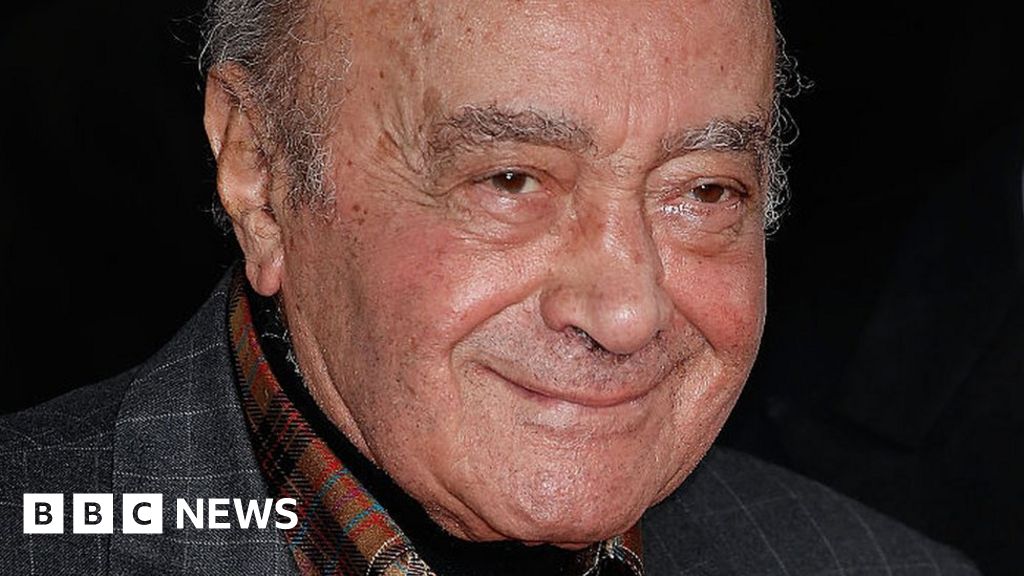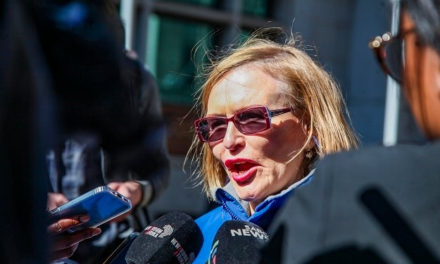Image source, Getty Images
Mr Al Fayed, pictured in 2015
Mohamed Al Fayed, the former Harrods boss whose son Dodi was killed in a car crash alongside Diana, Princess of Wales, has died aged 94.
Born in Egypt, he built a business empire in the Middle East before moving to the UK in the 1970s.
However, he never realised his ambition to gain a passport for his adopted country.
He spent his later years questioning the circumstances surrounding the deaths of Dodi and Diana.
Mr Al Fayed had remained largely out of the public limelight in the past decade, living in his Surrey mansion with his wife Heini.
In a statement released on Friday, his family said: “Mrs Mohamed Al Fayed, her children and grandchildren wish to confirm that her beloved husband, their father and their grandfather, Mohamed, has passed away peacefully of old age on Wednesday August 30, 2023.
“He enjoyed a long and fulfilled retirement surrounded by his loved ones.”
After the sale of Harrods to Qatar in 2010 Mr Al Fayed stayed on as honorary chairman for six months
Fulham Football Club, which Mr Al Fayed owned for many years, said that it was “incredibly saddened to learn” of his death.
“We owe Mohamed a debt of gratitude for what he did for our club, and our thoughts now are with his family and friends at this sombre time,” it said in a statement.
His successor at the club, Shahid Khan, expressed his condolences in a tribute on the club’s website.
“The story of Fulham cannot be told without a chapter on the positive impact of Mr Al Fayed as chairman,” he said.
“His legacy will be remembered for our promotion to the Premier League, a Europa League Final, and moments of magic by players and teams alike.”
Mr Khan said Mr Al Fayed was “wise, colourful and committed to Fulham” and that his legacy would “always be at the heart of our tradition” at the club.
Mr Al Fayed rose from selling fizzy drinks on the streets of his native Alexandria in Egypt to become a big name in business with all the right contacts.
His break came after he met his first wife, Samira Khashoggi, the sister of Saudi millionaire arms dealer Adnan Khashoggi – who employed him in his Saudi Arabian import business.
The role helped him forge new connections in Egypt, and although the marriage lasted little more than two years, Mr Al Fayed went on to launch his own a shipping business.
In 1966, he became an adviser to one of the world’s richest men, the Sultan of Brunei.
He moved to Britain in 1974 and five years later bought the Paris Ritz hotel with his brother Ali for £20m.
They went on to take over Harrods in 1985 for £615m, following a vicious bidding war with mining conglomerate the Lonrho group.
Under his ownership, Fulham FC rose from the third tier to the Premier League.
He gave generously to charities including Great Ormond Street Hospital and, as a father of five, showed a particular interest in helping underprivileged or unwell children.
He set up the Al Fayed Charitable Foundation in 1987 to better the lives of impoverished, traumatised and very sick youngsters.
It was from his Ritz hotel in Paris that his son Dodi, a film producer, and his then-partner Diana, Princess of Wales, departed, before the car crash which killed them both in 1997.
Mr Al Fayed never recovered from the shock of the crash, becoming obsessed with the speculation surrounding the deaths.
His evidence at the inquest in February 2008 included claims that the deaths were on the orders of Prince Philip and with the connivance of MI6.
They were deemed a “conspiracy theory” by the coroner and rejected by the jury.
Mr Al Fayed, with his wife Heini, at the funeral of Princess Diana in 1997
Mr Al Fayed twice failed in his attempt to secured British citizenship.
On the second occasion in 1995, angered by the rejection, he told the press that he had paid two Conservative ministers, Neil Hamilton and Tim Smith, to ask questions in the House of Commons about his interests.
They both left the government, and Mr Hamilton, who denied the allegation, also lost a libel case against Mr Al Fayed.
A third politician, Jonathan Aitken, who was then a cabinet minister, also resigned after Mr Al Fayed revealed that he stayed for free at the Ritz in Paris at the same time as a group of Saudi arms dealers.
In 2010, Mr Al Fayed sold Harrods to the sovereign wealth fund of Qatar. Nearly half of the purchase price was used to clear the company’s debts.




